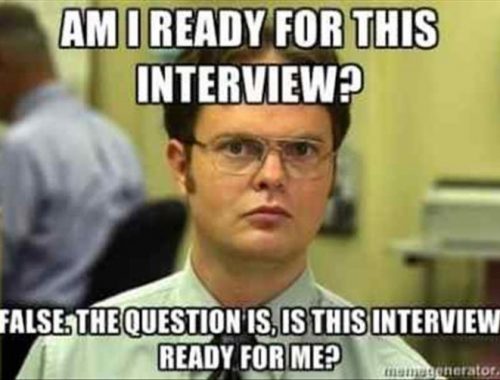What I never knew about Interviews
Reflecting on my life and the job interviews I have had and ‘prepared’ for up to now, I realised just how unprepared I am for the world of graduate job interviews. The lecture on interview skills at the start of my second semester truly highlighted how different interviews are at a graduate level compared to the interviews I have become accustomed to while looking for part time work throughout my studies. A factor I found most contrasting was the amount of preparation that is expected and required when considering an interview for a graduate job, this was something that I had not yet come across in any of my previous interviews which had all been largely focused in the hospitality and retail fields. In preparing for the stimulated interviews, this was what surprised me most.
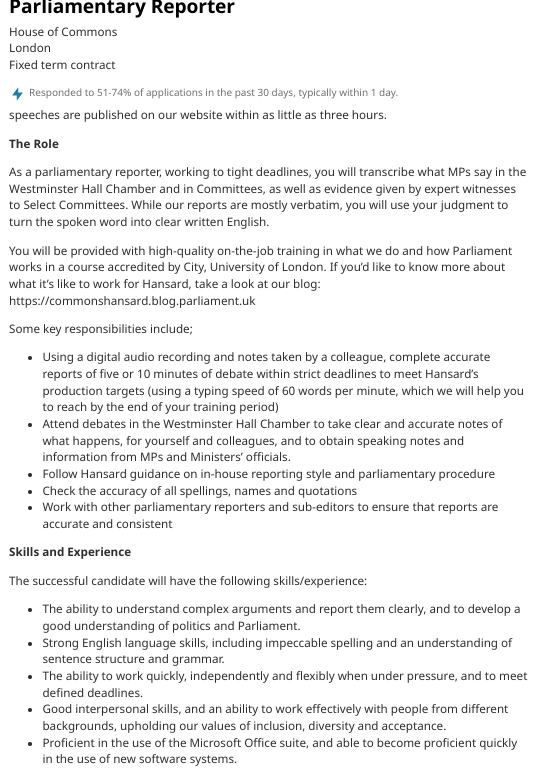
Firstly, to begin preparing for the stimulated interviews I had to choose a job that I would like to be interviewed for. In order for this simulated interview to really be beneficial for me I wanted to choose a job that I would really be interested in going into after graduation. This already had me researching job roles much more than ever before. The research I put into choosing this job for the stimulated interview turned out to benefit me greatly in my preparation for the interview. In the past, other than a brief google of the company a few minutes before the interview I had never once put much if any effort or thought into researching or preparing for any interview.
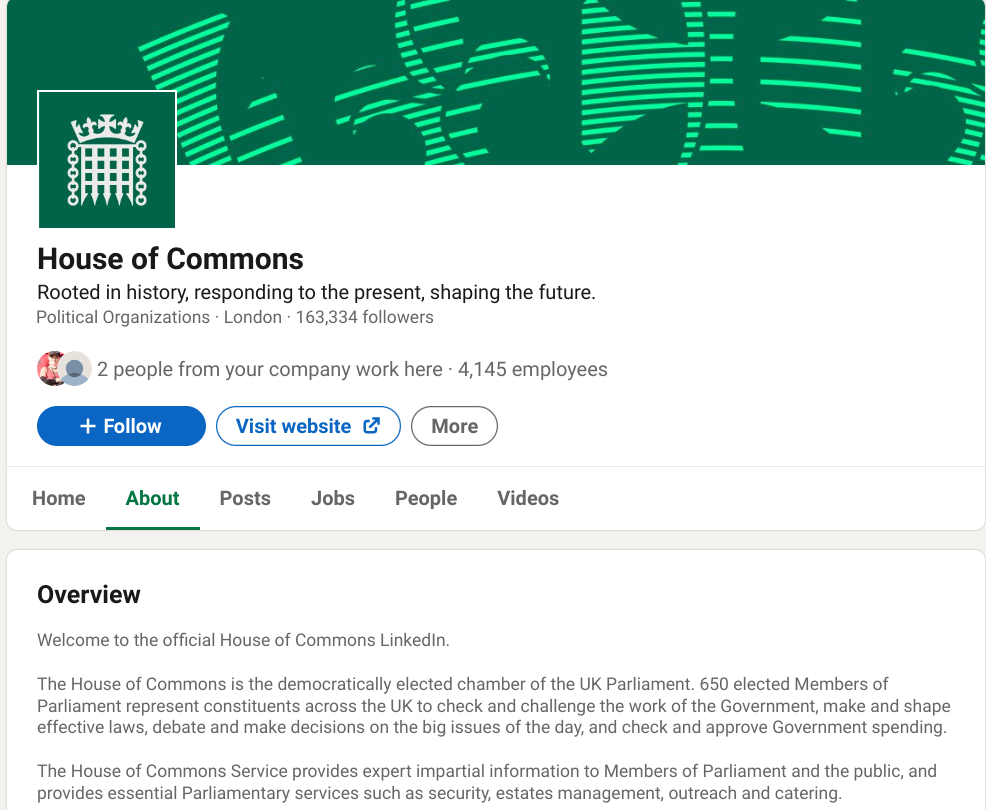
However, after only a brief look at how to prepare for an interview I saw the same advice time and time again : research the role and the company. One tip I learnt that I had not considered myself when researching the job role to be interviewed for was to use their LinkedIn page, ‘from press releases and blogs to the company’s website itself and their LinkedIn page, read any bit of content you can find.’ (Walton 2018). It really shocked me just how much information you are expected to know when going into an interview such as ‘who their competitors are’, ‘key people in the business’ and ‘which markets/areas/countries they operate in’ (Fennell 2021). However, using LinkedIn as a source of information and a key research website really helped give me more of an in depth look at the company that I otherwise would not have gained. Going forward I will definitely start using LinkedIn to research the company as well as looking up my interviewers to ‘analyse their current roles and prior experience to understand their professional perspectives’ (Iris 2020) as well as checking to see if they have any reviews that may benefit me further.
Now that I had done my research on the company and the role, it was time to really start preparing for the interview process. I initially turned to advice blogs to find out what would really be expected of me during the actual interview. I was trying to find out what I should wear and if there was anything I should bring with me. Most blogs agreed to bring a copy of my CV and even to bring reference sheets to help me appear more organised as well as allow the interview to progress more smoothly had the interviewer had any problems with printing or getting access to my CV. I was also surprised by the number of blogs that advised I bring a notepad and pen with me to take my own notes of the interview, this was something I would never have considered but now believe to be beneficial as it allows me to take quick notes of the interview process which will help me be more prepared if I have to go on to a second interview or even just for any other interviews in the future. Moreover, I found that the advice on what to wear to the interview to be very useful. At previous interviews I always tried to dress appropriately but not overly smart or professional. I found that it was best for this interview to ‘try and mirror their culture to an extent’ (McCormack 2017) when going in for an interview. This would mean dressing as though I already work there, really pushing the impression that I am already a part of their team.
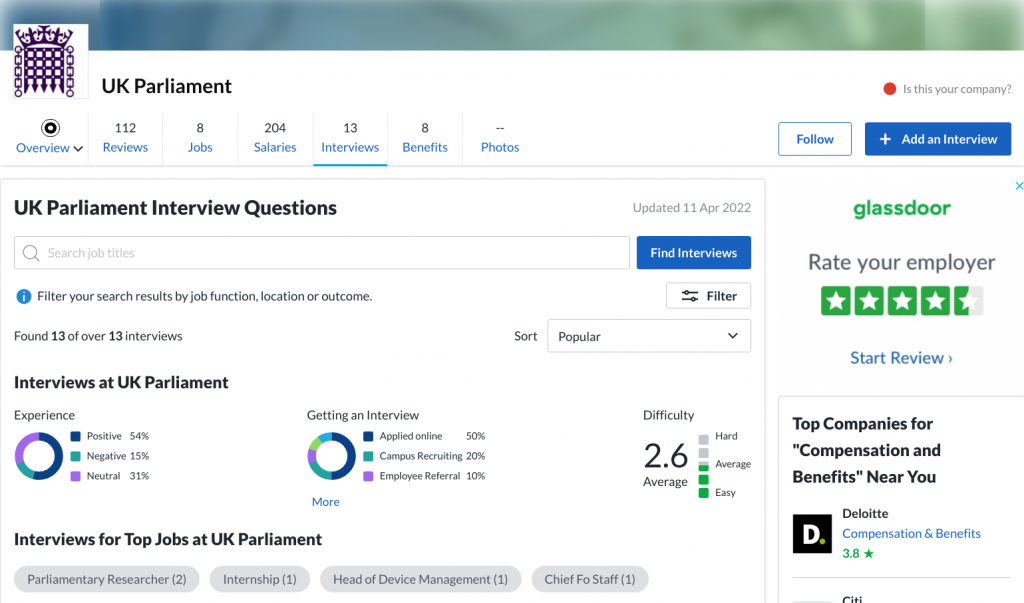
Perhaps the most daunting experience of any interview is the questions. I really never expected that you could prepare for questions without knowing them and would always go into interviews blind, only expecting the usual tell me about yourself type of questions. Having already researched the role and the company it was easy to ‘research questions that are going to be specific to the job role’ (Walton 2018), but what I really found difficult was trying to figure out how I wanted to communicate and be perceived by my interviewers in relation to this role. I found that it was best to ‘think of 20-30 stories you can share from different areas of your life’ (Iris 2020) in the STAR format that could be applied to different situational questions that may be asked. I also found that looking at ‘employer evaluation sites such as Glassdoor’ (McCormack 2017) and even Indeed was very useful for me as they have sections that are dedicated to the interview process of whatever company you look up. This included things from the questions asked, the length of the interview and even the dress code of the interview.
Overall, the preparation for the simulated interviews really opened my eyes to what is really expected from the interview process and has given me a much more realistic view on interviews post graduation. There are many skills and tips I have gained from this process that will greatly benefit me and my future endeavours but the most encouraging of all is that ‘positivity is contagious’ (Iris 2020), and a positive and confident attitude is just as important as being prepared.
Bibliography
Fennell, A 2021, How to prepare for a job interview – The Ultimate Guide, StandOutCV, viewed 24 February 2023, <https://standout-cv.com/blogs/interview-preparation-technique-blog/how-to-prepare-for-a-job-interview>.
Iris 2020, How to Prepare for Job Interviews, Coursera Blog, viewed 24 February 2023, <https://blog.coursera.org/how-to-prepare-for-job-interviews/>.
Job Search | Indeed n.d., uk.indeed.com, viewed 24 February 2023, <https://uk.indeed.com/?from=gnav-app-tracker>.
linkedin 2022, LinkedIn, Linkedin.com, viewed 24 February 2023, <https://www.linkedin.com/feed/>.
McCormack, A 2017, BLOG: Prepare to smash your job interview, MacStaff, viewed 24 February 2023, <https://macstaff.co.uk/interview-preperation-technique/>.
Preparing for an interview | Student Centre | Queen’s University Belfast 2020, www.qub.ac.uk, viewed 24 February 2023, <https://www.qub.ac.uk/directorates/sgc/careers/CVsMakingApplicationsandInterviews/interviews/Preparingforaninterview/>.
prospects 2000, Prospects.ac.uk, Prospects.ac.uk, Prospects, viewed 24 February 2023, <https://www.prospects.ac.uk/>.
UK Parliament Interview Questions (2023) n.d., www.glassdoor.co.uk, viewed 24 February 2023, <https://www.glassdoor.co.uk/Interview/UK-Parliament-Interview-Questions-E341565.htm>.
UK Parliament Reviews: What Is It Like to Work At UK Parliament? n.d., www.glassdoor.co.uk, viewed 24 February 2023, <https://www.glassdoor.co.uk/Reviews/UK-Parliament-Reviews-E341565.htm>.
Walton, J 2018, Our top tips when preparing for an interview, www.live-recruitment.co.uk, viewed 24 February 2023, <https://www.live-recruitment.co.uk/blog/2018/01/our-top-tips-when-preparing-for-an-interview>.
Not Another Interview!
We'll be in touch
You May Also Like

Interview a New You! – Becoming an Interview Guru
24 February 2023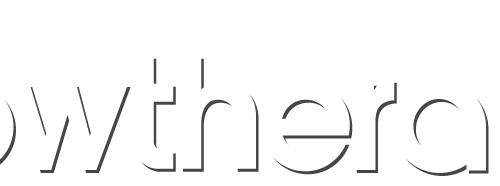
Working with a Production House
30 November 2022